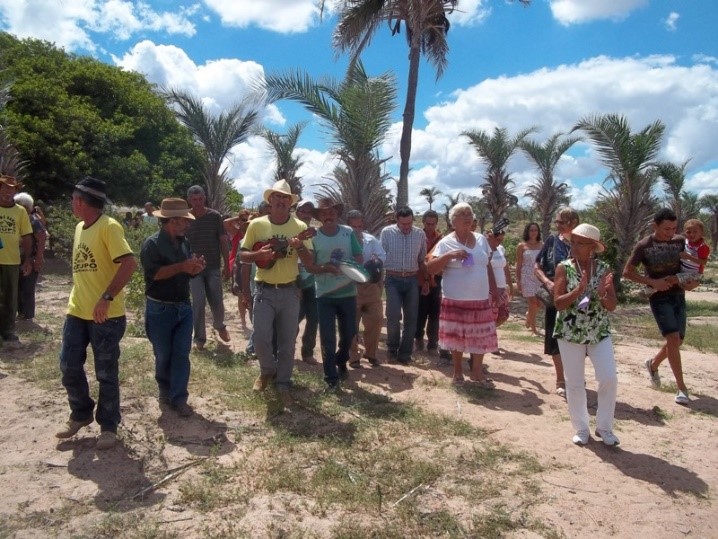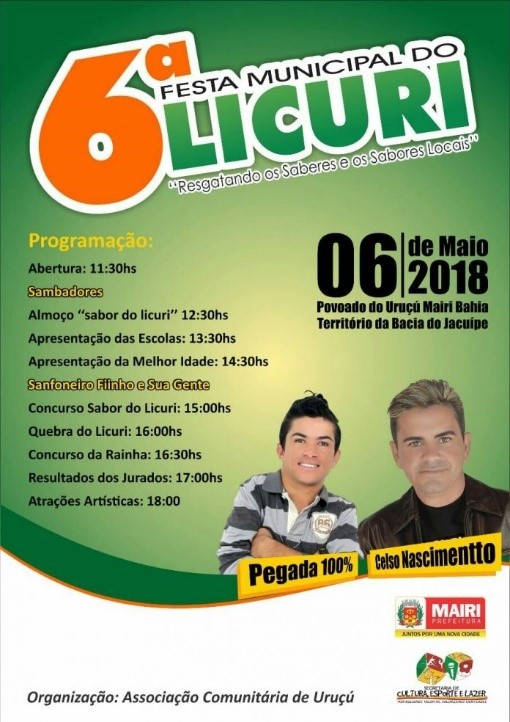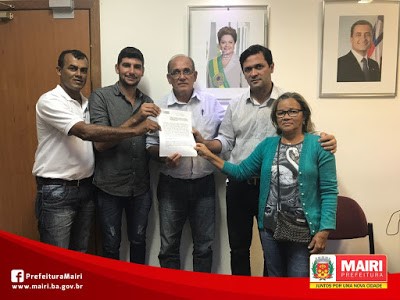Sustainable Cultivation and use of the Licuri and other native fruits - Community Association of Uruçú
Description
The project was initiated by a community association of peasant farmers in 2015 in the arid and drought-prone region of Bahia, Brazil. The Municipality of Mairi, just as Brazil as a whole, is characterized by great social inequality and little investment in the countryside. The families involved in the project have little income. Because of remoteness of the community, difficulty of access and lack of job opportunities, youth emigrate to the big cities. The area has an abundance of indigenous tropical fruit trees which tended to be neglected and their food value potential often ignored. Through this initiative the Association is taking full advantage of the indigenous licuri palm and other native plants, and promoting their sustainable cultivation, processing and full utilization.
The main aim of the project is to guarantee social, economic and environment sustainability to the residents of a community which has no possibilities for a sustainable livelihood other than migrating to the big cities to seek employment. It does this by creating an empowered local production network that takes full advantage of the indigenous species of trees and plants as a sustainable form of livelihood, adapted to challenging local conditions. In addition to providing employment, the project aims to make a marked impression on the local market with the sale of fruit pulp and oil from the licuri palm and by providing the local people with opportunities to sell their fruit for local processing. The oil production is a novelty in the area and has attracted great interest. The project values the work of women, raises self-esteem, and works to prevent the exodus from rural areas by engaging youth and developing the natural potential of the biome,. This project applies most specifically to SDGs 1,2, 8, 10, and 13.<br />
Initially the fruit had to be brought to a neighbouring town 45 km away for the licuri oil to be extracted. Thanks to the success of a grant proposal, funds were obtained to purchase the necessary equipment, enabling the community to do the extraction and processing locally. The local Town Council is obliged by law to buy 1/3 of its food products from local small businesses. This proved to be a great launching project for the sales and an incentive to maintain a high standard of quality of the processed products. <br />
Prior to the project, longer droughts meant that large scale producers were rced to cut the plants to feed their animals. Because the community’s awareness regarding predatory practices has been raised, they are now alert to the risk and guard against this. <br />
Features which make it an effective response to the SDGs/2030 Agenda include integration of environmental, social, economic indicators; design for acceleration of progress or for reaching the furthest behind; the clear interlinkages among the SDGs; institutional changes; other innovative change in line with the transformative spirit of the 2030 Agenda.
PNAE (the National School Food Program) is the main customer of processed fruits. The local Town Council purchases the products. Up to date equipment was acquired thought the partnership with a faith based Irish Funding agency, Misean Cara. Partnerships with other SENA – National Industry Service, CESOL – Public Centre for Economic Solidarity, IFBA (the Federal Distict of Bahiat) and CPT - the Land Commission have provided workshops, skills development, support and training. The Federal University of Bahia in Salvador is engaged in related research on the Licuri palm.
The Association of Uruçu is situated in a remote hamlet, difficult to access, about 20 kilometres outside the town of Mairi. The people were faced with many financial and social problems with the migration of youth being a great concern for parents because many young people who migrated to the big cities did not return and fell prey to violence and drug abuse.
The first ideas were sown about about seven years ago when the RSHM came to live in the locality and engaged the community in discussions about how the people could do something to improve their lives. After numerous meetings and discussions with the community and with different organizations, including the Land Commission group, the community association recognised the potential that their own community and families had in terms of human resources and raw materials. It was noted that the association held a licuri cultural festival every year where people displayed their culinary talents. This was seen as a valuable resource since it provided an important cultural event in the local town which attracted people from the surrounding region .
Representatives of the community visited similar projects in the State of Bahia and this encouraged the people of Uruçu to launch the project with the support of the sisters and other organizations.
The project is carried out with the support of local people. The association meets monthly and, when necessary, on extraordinary occasions. This group has created a process for planning, monitoring, and evaluation, accountability, and a clear work plan. Periodic workshops have helped to build capacity of participants, providing new skills and expanding the number and type of products made from the Licuri, - even making bricks made from the palm kernel shells. Avenues for marketing have been opened, with the support form local, regional and national government agencies. Fundraising led to a successful grant application which has enabled the purchase of processing equipment.
While they sell pulp from all the fruits, they concentrate on the licuri fruit which has multiple values and possibilities for trading including oil from the fruit which is rich in iron, calcium, copper, magnesium, zinc, mineral salts and beta carotene. The licuri fruit has been under-valued because of the difficulty in extracting pulp or oil because of the hard shell of the fruit. The oil is used for cooking and can be used to produce cosmetic products. As this is the only project in the region that works with the licuri to this extent there is a lot of interest in how the project is developing its value, and the Federal University of Bahia in Salvador is engaged in research of the fruit.
Products made from the fruits during festive times are sold at stalls. These sales boost their resources. With time they hope to be able to make other products such as tarts, cakes etc. on a more constant basis from the fruit to sell to cafes, restaurants and to private party groups.
The fruit is bought from local people, thus helping other small farmers to have a market for their seasonal fruit. When made into pulp it is sold by the kilo at a higher price with the profit relating to the quantity of pulp sold. The pulp is totally natural and does not contain any preservatives. In addition to improving the income of members of the Association, healthy food is available locally, skills have been developed, youth involved and leadership qualities developed. As well as bringing health benefits, the project has raised awareness of the implications of preservatives on people’s health.
The Association is helping to link agro-ecological producers, improving their livelihoods and increasing the distribution of income in an area where people are deprived of basic rights and negatively affected by deforestation and desertification. It is helping to diminish the number of people migrating to urban areas. Women are moving into leadership roles. The mini-factory is functioning and providing enough income for the upkeep of families. The balance of production, in the rainy season and in times of drought, as well as during the dry season. Healthy practices and eating habits are being taught in schools which it is hoped will give rise to a healthy generation who are knowledgeable about food and agroecology. A dialogue has been maintained with the producers to articulate and maintain the focus on Agro-Ecological production. The festival of Licuri is publicly celebrated each year, to generate wealth for the community and promote cultural exchange. Plant waste is being utilized and distributed to producers for the creation of cultural artifacts and household items, which in turn aids in the development of a circular economy.
Even though the region is rich in fruit there are few projects or associations that produce large quantities of fruit pulp. The project is assured of a market for their fruit and encouraged to cultivate their fruit trees to attain maximum production. Consequently, they are making a livelihood from their own back yards. In Mairi, the local town, there is a need for the purchase of fruit in larger quantities, especially out of season fruit which the project is fortunate to be able to provide because of the acquisition of a cold chamber from a grant received from Misean Cara.
The local education Department has an obligation to buy one third of food for schools from small rural organizations and the Association is succeeding in conquering more and more space in this market because of the improvement of the quality of their produce.
The Association attends regular meetings with the Mairi town council and the Board of Education to ensure that they comply with the Federal Government ruling concerning licuri. They also attend meetings with the Department for Food Safety and Sanitation to be kept up to date with new policies and also to advocate for the Department to provide better sanitary conditions for the community in general. In times of disease out breaks, which are bound to occur at least once a year they petition the Department for medications free of charge for the victims as they believe had the community been provided with decent facilities the outbreak of diseases would not have occurred.
While impact can only be assessed in the long term, the initial results are very positive. The unconventional approach to agriculture that is being used in this project provides an example of sustainable, regenerative practices for the community. It utilizes traditional knowledge systems, and empowers the community through employment opportunities, civil engagement, and cultural exchange. <br />
Valuing the sustainable cultivation of the native licuri palm and demonstrating that local small enterprises can provide livelihoods also guards against further deforestation and migration to the cities.
SDGS & Targets
Deliverables & Timeline
Resources mobilized
Partnership Progress
| Name | Description |
|---|
Feedback
Action Network


Timeline
Entity
Region
- Latin America and the Caribbean
Geographical coverage
Photos



Website/More information
Countries

Contact Information
Veronica Brand, NGO Representative
